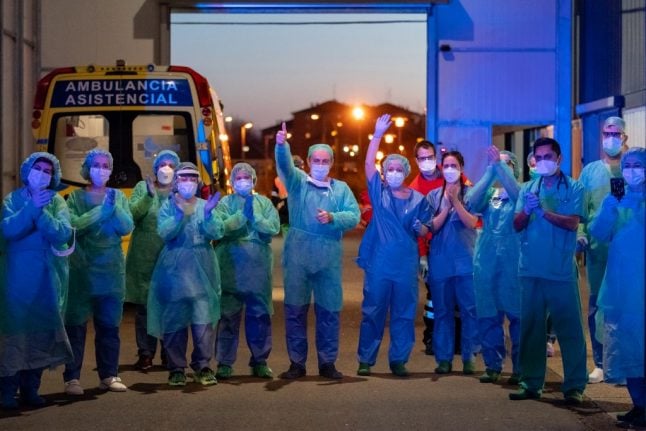The coronavirus death toll in Spain surged to 4,089 after 655 people died within 24 hours, the health ministry said on Thursday.
It was a 19 percent increase on figures released on Wednesday. The number of confirmed cases of COVID-19 rose to 56,188 in Spain, which has the world's second highest death toll from the disease after Italy.
On Wednesday, Spain overtook China in the number of deaths officially attributed to the coronavirus.
But on the plus side, the rise in the number of new deaths was smaller than that recorded on Wednesday when the figure rose by 738 or 27 percent.
In other good news, the data showed that 1,068 people had recovered in the last day and been discharged from hospital.
Meanwhile, the number of confirmed cases of COVID-19 rose to 56,188, the ministry said.
Despite a national lockdown imposed on March 14th, which parliament on Thursday agreed to extend until April 11th, both deaths and infections have continued to mount, with officials warning this week would be particularly bad.
Health authorities are hoping it will soon become clear whether the lockdown is having the desired effect.
Against that backdrop the improvement was more than welcomed as suggesting the authorities might just finally be making some progress.
The recent figures “indicate a change in the trend… which make us think that we are starting to enter a phase of stabilisation,” Health Minister Salvador Illa said.
“If this general trend is confirmed… the number of cases may have neared its maximum, the peak ,” he added.
The Madrid region has suffered the brunt of the epidemic with 17,166 infections — just under a third of the total — and 2,090 deaths, or 51 percent of the national figure.
Publicados los datos actualizados de #COVID2019
Consulta aquí la situación en España https://t.co/skv9oHroYj#EsteVirusLoParamosUnidos pic.twitter.com/3tklazLsJg
— Ministerio de Sanidad (@sanidadgob) March 26, 2020
Prime Minister Pedro Sanchez, whose wife is infected with the virus, has said this is the country's most difficult moment since its 1936-39 civil war.
“Only the oldest, who knew the hardships of the civil war and its aftermath, can remember collective situations that were harsher than the current one. The other generations in Spain have never, ever had to face as a collective something so hard,” he said when he imposed the state of emergency on March 14th.
Spain's demographics partly explain why it has been one of the worst-affected nations.
The country has one of the longest life expectancies in Europe and the pandemic has taken a high toll on its large elderly population, who are especially vulnerable to the disease.

With hospitals on the brink of collapse from the surge in patients, troops have set up a massive field hospital in Madrid's vast IFEMA exhibition centre which currently has 1,500 beds but which could be expanded to take in up to 5,500 people — making it the largest hospital in Spain.
And with the city's funeral services overwhelmed, officials have commandeered the Palacio de Hielo ice skating rink to serve as a temporary morgue.
READ ALSO:



 Please whitelist us to continue reading.
Please whitelist us to continue reading.
I appreciate greatly your daily updates. However, I think today’s headline about the doubling of figures since Sunday is leaning into fear mongering. I say this because while the numbers remains horrifying, Spain is no longer doubling its figures after 3 days. It’s now 4, almost 5 days, which suggests a pull back in the rate of the surge of new cases. People are fearful and anxious with good reason, but headlines shouldn’t tip the scales unnecessarily. Again, thank you for your good work at this tough time.